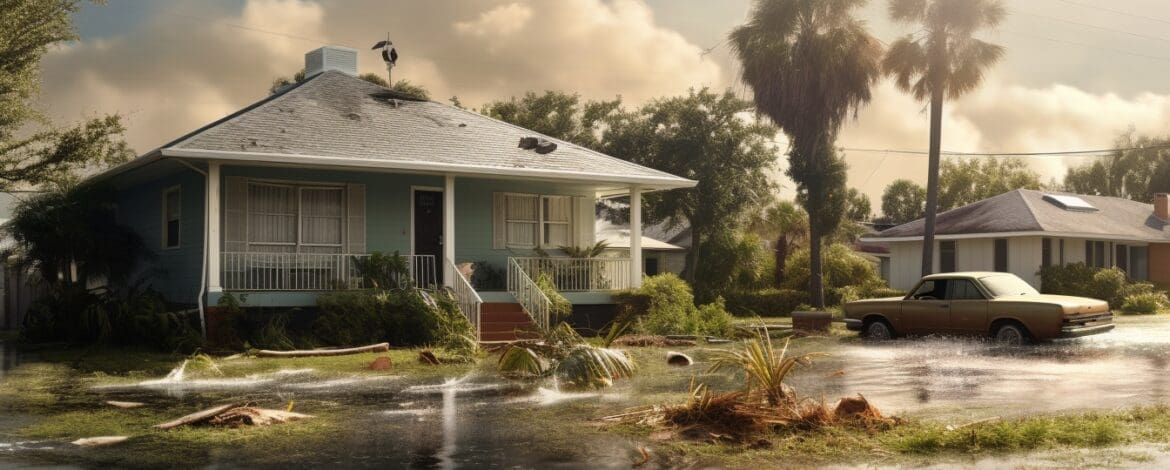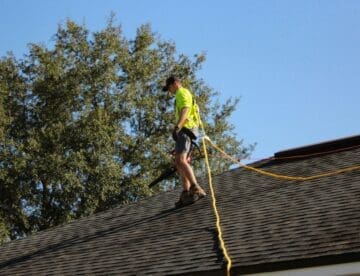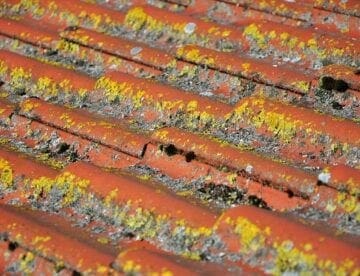Climate change means that roofs in Florida must withstand increasingly extreme weather conditions. Wetter weather, severe storms, and higher temperatures in the Sunshine State bring many challenges for homeowners. By understanding the potential impacts of the climate crisis on your home’s roofs and implementing preventative measures, you can future-proof your property from more extreme weather patterns.
Florida is no stranger to hurricanes, heavy rain, year-long sunshine, and scorching heat. These conditions can wreak havoc on your roof. These lead to costly repairs or even require a full replacement. With climate change exacerbating these weather patterns, it’s essential to take proactive measures to ensure your roof can withstand the elements.
This article explores various ways you can protect your roof from the impact of extreme climate events. These practical tips will also help mitigate potential damage, saving you repair costs down the line.
Understanding Climate Change in Florida
Florida’s unique geography makes it susceptible to a range of climate-related challenges. And your home’s roof is the first line of defense against harsh weather conditions. Unfortunately, studies show extreme weather events and higher temperatures will occur more frequently.
The University of Florida reports that average temperatures exceeding 95°F will rise from an average of seven days a year to 26 days annually. It was reported that Tampa had its hottest July Fourth on record in 2023, with temperatures hitting 97°F.
But it’s not just intense heat beating down on Florida roofs that are an issue. Scientists predict that higher temperatures and more air moisture will cause more frequent and intense storms and hurricanes. And it seems that Florida is set to take the brunt of these intense hurricanes and tropical storms.
How do the effects of climate change impact your roof? Here are a few facts to consider:
- UV Damage: The sun’s UV rays damage the external surface of shingles, causing them to decay and age faster. This also causes shingles to become brittle, leading to cracks and roof leaks.
- Heat: Dark-colored roofing materials absorb heat, causing homes to become hotter. Also, excessive heat breaks down adhesives and sealants, causing leaks.
- Humidity: High humidity promotes mold, mildew, and algae growth, impacting the integrity of the roof’s surface. Damp conditions corrode metal roofs and accelerate the decay of wooden roofing components.
- Storm Damage: High winds, lashing rain, hail, and flying debris can damage roofing components and structures.
The Impact on Homeowners’ Insurance Premiums
Climate change also impacts your pocket in terms of increased insurance premiums. An increase in claims results in higher costs for insurance companies. They then pass these costs on to you through rising insurance premiums.
Here are some sobering statistics on the financial impact on homeowners in Florida caused by climate change:
- Floridians pay an average of 13 percent more in cooling costs than the average homeowner in the United States. Until 2040, Florida residents could be paying an additional $122 in energy costs annually.
- Storm damage caused by Hurricane Ian in 2022 cost around $67 billion to repair damaged homes, infrastructure, and local economies.
- Homeowners’ insurance premiums in Florida are set to rise by 40 percent in 2023, meaning residents must pay more than three times the national average.
The increasing frequency and severity of weather events due to climate change mean one thing for homeowners — higher insurance premiums and more frequent roof repairs.
Weather-Proofing Your Roof – A Comprehensive Guide
Maintaining roof integrity is crucial for protecting your home and your wallet. A resilient, weather-proof roof means fewer repairs and lower insurance premiums. By investing in weather-resistant additions, regular inspections, and choosing the right roofing materials, you can minimize the need for costly repairs.
Choosing the Right Roofing Material
Choosing the right roofing material is crucial when weather-proofing your roof in Florida. Here are some of the best options that help withstand extreme weather events and provide long-lasting protection.
- Metal Roofs: Metal roofing is incredibly durable and can withstand high winds, hail, and even fire. It has a longer lifespan compared to traditional asphalt shingles. Also, metal reflects the sun’s rays — making it a suitable “cool roof” material to reduce energy costs. The cost of metal roof installation can be a drawback.
- Ceramic or Clay Tiles: These have high wind resistance and can last up to 50 years. The ceramic tiles are aesthetically attractive and absorb little heat — ideal for Florida’s tropical climate. Like metal roofs, ceramic tiles are expensive to install.
- Concrete Tiles: More lightweight than clay tiles, concrete tiles are an attractive option for Florida homes. They are durable and fire-resistant. However, they can break easier than other roofing materials.
- Asphalt Shingles: Although not the best roofing material for Florida’s harsh climate, asphalt shingles are the most popular option due to cost. However, to future-proof your home from extreme weather events, you should consider installing a metal roof or ceramic tiles if you need to replace a roof in Florida.
When choosing a roofing material, it’s important to consult with a professional roofing contractor. They can assess your needs and recommend the best material based on your location, budget, and aesthetic preferences.
Regular Inspections and Maintenance
Regular roof inspections and maintenance are crucial to protect your home and hard-earned cash in Florida’s unpredictable climate. With regular inspections, a professional roofing contractor can identify potential issues before they become major problems. Regularly inspecting and maintaining your roof is crucial for extending its lifespan.
During a roof inspection, the contractor will look for the following:
- Check for signs of damage, like loose or missing shingles.
- Inspect the flashing around chimneys and vents.
- Check that gutters and downspouts are working properly to ensure proper drainage.
- Use a FLIR camera to detect hidden leaks and unseen moisture in the roofing structure.
By arranging regular roof check-ups and addressing issues promptly, you can ensure the longevity and durability of your roof, minimizing the risk of extensive damage and expensive repairs.
Investing in Weather-Resistant Additions
Weather-resistant enhancements can make your roof more resilient in Florida’s heat, sunshine, humidity, and hurricane season.
Here are some ways to protect your roof and prevent the need for costly repairs:
- Roof Coating and Sealing: A high-quality roof sealant provides extra protection against water infiltration, UV rays, and other weather elements. This can help prolong the roof’s life and reduce the risk of leaks.
- Hurricane Straps: Add hurricane straps or clips to strengthen the roof structure, helping it withstand high winds and storms better.
- Reflective Roof Coating: A reflective roof coating prevents heat absorption and helps reduce energy bills.
Working with Your Insurance Policy
The right insurance policy is crucial for Florida homeowners. Your homeowners’ insurance should provide enough coverage if your roof is damaged in a storm, extreme weather event, or natural disaster. However, how do you know you are adequately protected? Here are a few tips:
- Read the small print: Take the time to review your insurance policy and understand what’s covered. Look for specific clauses that address natural disasters, such as hurricanes, flood damage, or risk of wildfire.
- Check the deductibles: It makes sense to know how much you must pay out of your own pocket to repair or replace a roof.
- Document and report damage: In case of weather-related roof damage, document and report it promptly. Take detailed photographs or videos as evidence.
Benefits of a Weather-Resistant Roof
A weather-resistant roof has numerous short-term and long-term benefits. A weather-resistant roof is a small investment with big rewards. You can avoid costly repairs after a weather event and increase your property value. Also, your insurance may provide lower premiums and discounts if you weather-proof your roof.
Other benefits include the following:
- Immediate protection during a tropical storm or hurricane.
- Lower risk of water damage that causes mold growth and structural issues.
- Increase the value of your property.
Finding the Right Professionals
Finding a professional roofing contractor with experience in local weather conditions is crucial. They can advise on the right roofing materials for your home and budget. Here are some tips on selecting the right roofing contractor in Tampa Bay, Florida:
- Look for contractors with experience in dealing with specific climate risks in Florida.
- Seek referrals from friends, family, or neighbors who have recently had their roofs repaired or replaced.
- Ensure the roofing contractor has the necessary licenses, insurance, and certifications.
- Request written estimates from at least three contractors to compare prices, materials, and timelines.
- Check the warranties and guarantees the roofing contractor offers.
- Read online reviews and testimonials from previous clients.
Conclusion
Weather-proofing your roof in Florida protects your wallet. Climate change means taking proactive measures to protect your roof is vital. But, investing in a weather-resistant roof and choosing experienced roofing professionals can minimize the risk of damage, reduce the demand for energy, and save money in the long run.
Are you looking for a reliable and experienced roofing contractor in Tampa Bay, Florida, to ensure your roof is weather-resistant? Look no further than Code Engineered Systems. With over 20 years of experience in the roofing industry, we know what it takes to protect roofs in Florida against extreme weather conditions.
Contact Code Engineered Systems today for an accurate, no-obligation quote on weather-proofing your roof.
Protect your home and save money in Florida with these essential tips on how to safeguard your roof from the damaging effects of climate change.




